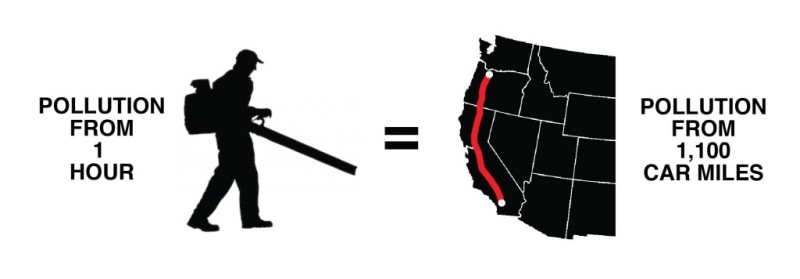MORE POLLUTING THAN CARS
Gas powered leaf blowers use two-cycle and four-cycle gasoline engines which produce hundreds of times more hazardous pollutants and fine particulates than automobiles. The State of California estimates that small engines such as those in leaf blowers will overtake automobiles to become the number one source of air pollution by 2020.
EXTREME NOISE
Gas powered leaf blowers create high intensity, low frequency noise that impacts nearby homes, schools and parks, disturbs wildlife, and consistently violates Portland’s noise ordinance. Operating a gas leaf blower can cause permanent hearing loss in 2 hours and can impact 90 nearby homes. The low frequency noise of gas blowers travels further than the noise from electric blowers and penetrates through windows more readily. Gas blowers create much more noise impact than electric blowers.
HEALTH RISKS
Emissions from gas leaf blowers create high levels of formaldehyde, benzene, fine particulate matter and smog forming chemicals, which are known to cause dizziness, headaches, asthma attacks, heart and lung disease, cancer and/or dementia.
Blowers also kick up unhealthy clouds of dust and debris that can include pollens, animal feces, fertilizers, pesticides, lead, asbestos, fine particulate matter, and more. Inhaling these substances in large quantities and with such velocity can have serious and insidious health consequences.
ENVIRONMENTAL HAZARDS
Re-fueling spills contaminate soil and waterways. Maintenance of gas powered leaf blowers produces toxic waste like fuel filters and contaminated air filters. Blowers erode, compact and dry out soil and harm plants, microorganisms and pollinators.
In addition to smog-forming emissions and toxic fumes, gas powered leaf blowers create CO2 emissions that contribute to the climate crisis.
MOST AT RISK
Operators of the equipment are most at risk, but the exhaust and dust is a danger to the general population – especially children, the elderly, people with chronic asthma and people exercising. Gas blowers are often used in parks and public spaces where many people are exposed to the dangers.
Download our Gas Powered Leaf Blower Noise and Emissions Factsheet for a useful summary of this information and sources.

Source: California Air Resources Board
https://www.quietcleanpdx.org/leaf-blowers-dangers-pollution/




